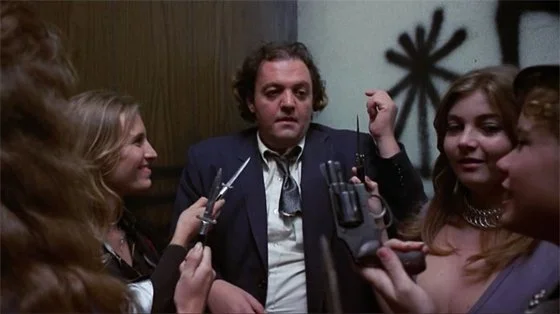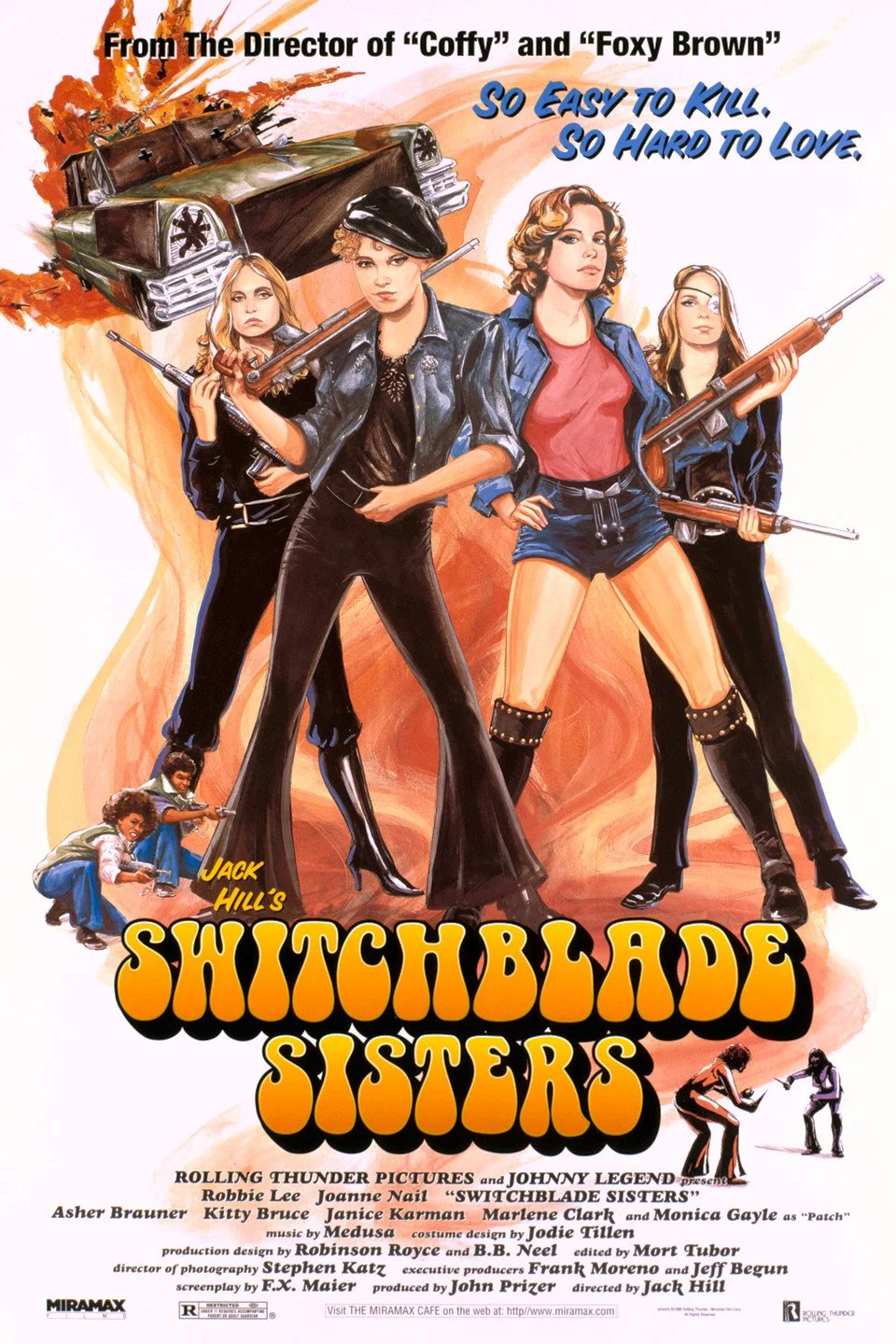SWITCHBLADE SISTERS (1975)
“Let me give you some advice, cop. You can beat us, chain us, lock us up. But we’re gonna be back! Understand? And when we do, cop, you better keep your ass off our turf, or we’ll blow it off! You dig? We’re Jezebels, cop. Remember that name. We’ll be back!”
With this impassioned speech, Jack Hill’s exploitation classic SWITCHBLADE SISTERS (1975) comes to a fiery close. It caps off 91 minutes of girl gang badassery, anticapitalist mayhem, and a decisive defeat of the patriarchy. Between tough-talking, switchblade-toting girls and a team-up to take down the men making their lives hell, female empowerment has rarely looked so cool or felt so attainable.
Maggie (Joanne Nail) is new in town, and she soon runs afoul of the Dagger Debs, a high school girl gang that supports the all-male Silver Daggers. When Maggie shows how tough and resourceful she is, the leader of the Dagger Debs, Lace (Robbie Lee), brings her into the fold. Second-in-command Patch (Monica Gayle) doesn’t like the new girl taking her place, so she starts pouring poison in Lace’s ear by convincing her that Maggie wants to take over as leader of the Debs and take Lace’s man, Dominic (Asher Brauner). Their rivalry leads to double-crosses and death, but the ride the story takes you on is nothing short of ‘70s exploitation joy.
One of the most refreshing aspects of SWITCHBLADE SISTERS is its lack of titillation. For a grindhouse flick about a girl gang that finds itself in juvenile hall, there’s a surprising dearth of sexploitation. Hill and screenwriter F.X. Maier are more concerned with the Debs’ complicated dynamics, and their thoughts and feelings about the world around them, than they are with how they look. The Lace-Dominic-Maggie love triangle avoids soap opera clichés, delving instead into thorny issues like loyalty and motherhood. Maggie refuses to go behind Lace’s back when Dominic expresses interest in her, though Lace fails to see Maggie’s friendship for what it is due to Patch’s interference. When Lace tells Dominic she’s pregnant, it causes a rift in their relationship that never heals, setting off a sequence of events that give Hill and company the opportunity for some truly explosive set pieces.
One of those set pieces comes courtesy of a team-up between the Debs and a gang of Black women led by Maggie’s friend Muff (Marlene Clark). Free of male control, they join forces to defeat Crabs (Chase Newhart), an oily “entrepreneur” who sells drugs to kids and has the biggest single gang in town. When the women combine their might, though, they pose a far greater challenge than Crabs’ rivals the Silver Daggers. The showdown by Crabs’ office is as action-packed as it gets, with a shootout, armored cars, and tough women hunting down the men who have wronged them. Revenge is especially sweet for Maggie, who had to put herself in a very vulnerable position with Crabs during her initiation into the Debs. SWITCHBLADE SISTERS doesn’t miss a single chance for a fist-pumping comeuppance or a “hell yeah” moment, and that’s just one of the many reasons it belongs on your watchlist.
Crabs isn’t the only capitalist pig the Debs set their sights on. The movie opens on a man visiting Lace’s mom to repossess her TV. When he gets on the elevator to leave with his money, the Debs trickle in on each floor, eventually surrounding the man in their leather-and-denim outfits and scornful smirks. They flick their switchblades open to scare him, but this is no idle threat: they’re more than ready to use their blades to slice him up and get back the money that belongs to Lace’s mom. He survives fairly unscathed (except for the fact that he’ll need a new suit), but it’s still an electric opening to a live-wire of a movie. The viewer knows who these girls are and what they’re about from the very first moments: they band together to fight the people who try to take advantage of them, and they’re not afraid of anyone, especially not the police.
Authority figures in SWITCHBLADE SISTERS, particularly police officers and prison officials, are ineffectual and corrupt. Though there’s little titillation in the juvenile hall scenes, there is a genre trope in the form of ‘predatory lesbian’ Mom Smackley (Kate Murtagh), the warden whose attempt to sexually assault Maggie leads the Debs to come to her rescue and beat up Smackley and her lackeys. During a knife fight, the police decide not to take any action until someone is dead, so that they’ll have a charge on the Debs that will stick so that they can put them away for far longer than a few nights in juvie. It’s a thorough indictment of those who are supposed to serve and protect the young women, proving once again that the Debs can only depend on each other.
It might seem counterintuitive that a ‘juvenile delinquent’ exploitation film could be aspirational, but that’s exactly what the cathartic SWITCHBLADE SISTERS is. Its girl gang members are tough, smart, and loyal, and they fight back fearlessly against the true bad guys: the police, the capitalists who value money over people, and the no-good men in their lives. With fierce performances and dynamic direction, Jack Hill’s SWITCHBLADE SISTERS will leave you shopping for a switchblade and looking to join your nearest girl gang.




